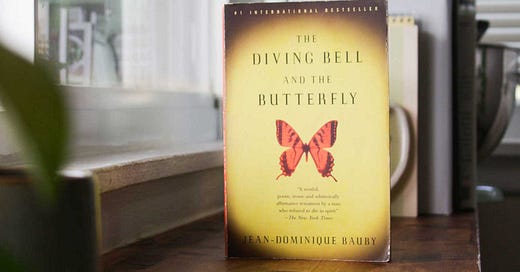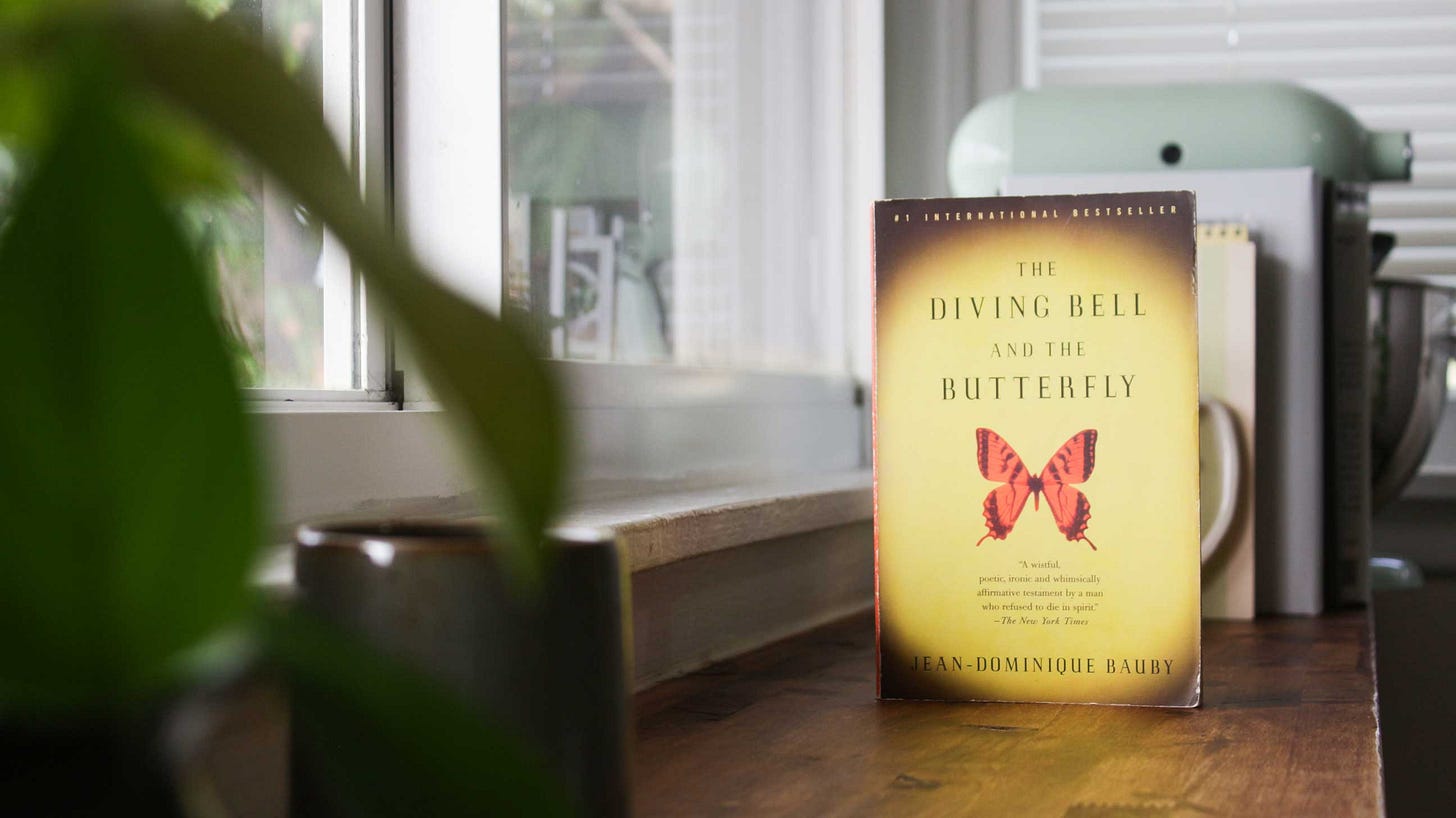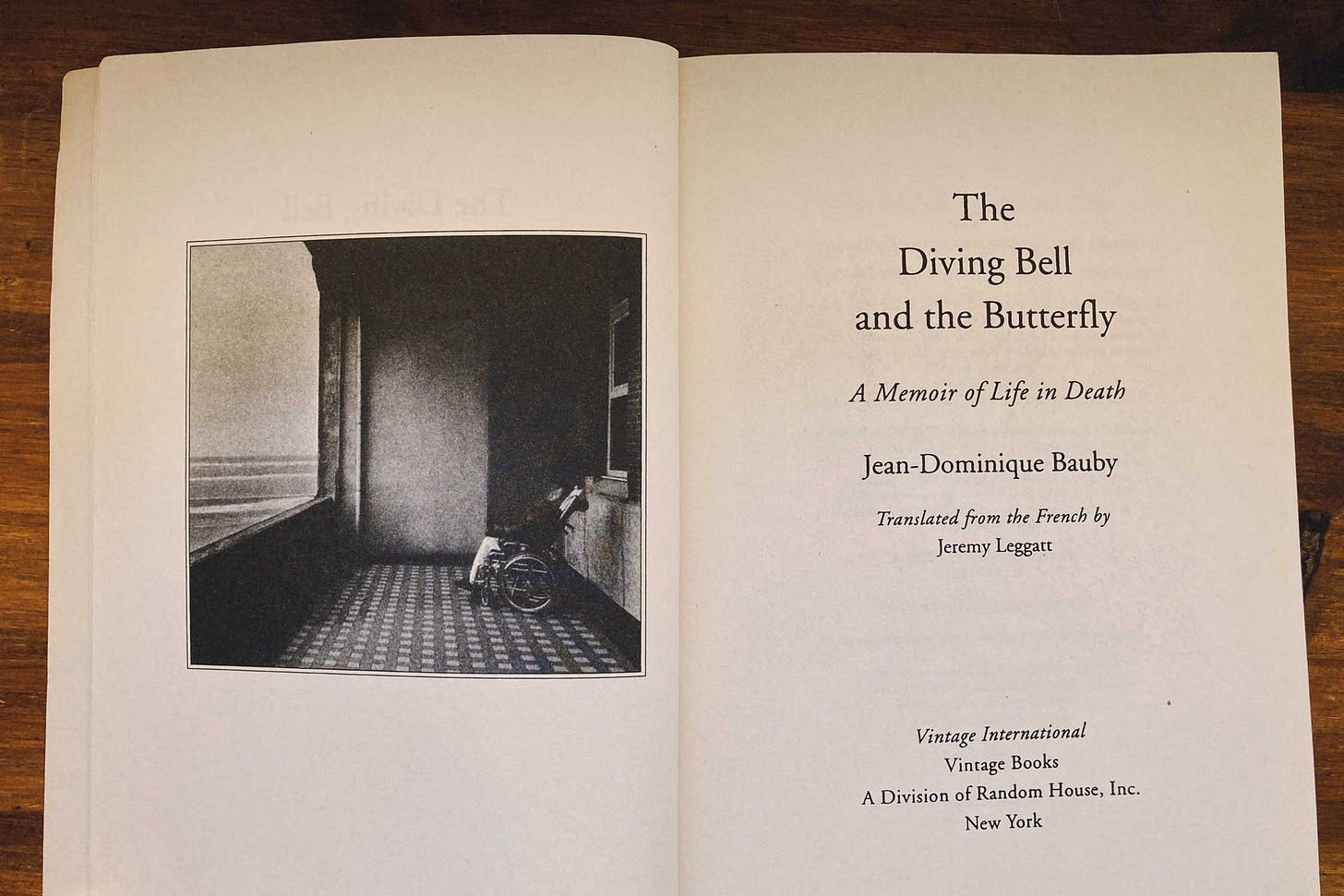No clickbait. I read this book for the first time years ago and re-read it last summer in an afternoon. It sort of lives in the back of my brain. I imagine it might do that for you too.
So what’s the book and why should I read it?
The Diving Bell and the Butterfly by Jean-Dominique Bauby is a very short memoir. (My copy is 133 pages, with a lot of white space and short chapters.) My re-read last summer took me a short afternoon, or you could read it slowly over a couple of evenings.
But — why read this? What’s it about?
The year is 1995. Jean-Dominique Bauby is an editor at the French magazine Elle. One day in early December, he suffers a stroke and becomes completely paralyzed. Alive, but locked-in inside his body. He is only 43 years old.
In the past, it was known as a “massive stroke,” and you simply died. But improved resuscitation techniques have now prolonged and refined the agony.
-from the Prologue
So…how is he writing a memoir, if he’s paralyzed?
Great question. Bauby somehow retains the movement of his left eyelid — in other words, he can blink (wink?) one eye. He uses a re-shuffled alphabet (based on the frequency the letters appear in French) and blinks when he hears the right letter.
It is a simple enough system. You read off the alphabet (ESA version, not ABC) until, with a blink of my eye, I stop you at the letter to be noted. The maneuver is repeated for the letters that follow, so that fairly soon you have a whole word, and then fragments of more or less intelligible sentences. That, at least, is the theory.
-from the chapter The Alphabet
He uses this system to communicate with friends and family who come to visit. But he also uses it to write the entire book.
And I do want to specify — this book does read like a book, that was written. Under the circumstances, it would have been understandable if the sentences were disjointed, disconnected, or overall lacked the beauty you might hope for in prose. You might expect it to sound like a ‘speech-to-text’ message.
But it’s beautiful.
You can see the effort Bauby put into his writing. (And he tells us about it.)
Enough rambling. My main task now is to compose the first of these bedridden travel notes so that I shall be ready when my publisher’s emissary arrives to take my dictation, letter by letter. In my head I churn over every sentence ten times, delete a word, add an adjective, and learn my text by heart, paragraph by paragraph.
-from the Prologue
Is it just a list of facts about his treatment?
No. When Bauby tells facts, he tells them selectively, as vignettes that together give a purer picture of his time in the hospital than an exhaustive biography could.
Some of the chapters cover his daily life as someone with locked-in syndrome, and they do so in the sharp facts and soft contemplation of someone who has had lots of time to think. (“My Lucky Day” is less than a page and possibly my favorite.)
Some of the chapters are brief philosophical musings. Some are flashbacks — good times (and arguments) with loved ones; the hustle-and-bustle of working at Elle; the day of the stroke itself. All are written with care and thought.
Her elbows on the small mobile Formica table that serves as her desk, Claude is reading out these pages we have patiently extracted from the void every afternoon for the last two months. Some pages I am pleased to see again. Others are disappointing. Do they add up to a book?
-from the chapter Season of Renewal
In conclusion
The book Bauby and transcriber Claude “patiently extracted from the void” is well worth reading. And it is worth reading on its own merit, not just because of the way it was written.
One of the main reasons I like to read (here’s a whole playlist of other reasons!) is to imagine myself living other lives. Not as escapism, but as a way to build empathy. (This works with fiction and non-fiction both.)
The Diving Bell and the Butterfly is one of the quickest, most potent, most condensed books for creating empathy and transporting you to a new point of view that I know of.
You can read it in an afternoon, but you’ll remember it your whole life.
Happy March & happy reading!
-Tim
P.S. Right as I finished writing this, I remembered I’d mentioned this book in a recommendation video last year — if you watched that already, consider this your sign to go read it! If you haven’t seen it, and want more of my thoughts on it, you can watch it here.






